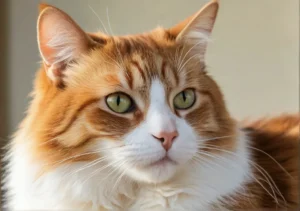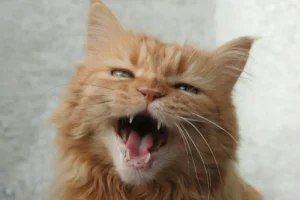Baby cats are some of the most adorable creatures on the planet, but their constant meowing can sometimes be a bit overwhelming. If you’ve ever wondered why these tiny felines are so vocal, you’re not alone. Understanding the reasons behind why baby cats meow so much can help you better care for and communicate with your furry little friend.
Baby cats meow so much because they are trying to communicate their needs and feelings to their caregivers. Whether they are hungry, scared, or simply seeking attention, meowing is their way of getting your attention and letting you know what they need. By understanding the reasons behind their meows, you can better respond to your kitten’s needs and strengthen your bond with them.
1. Hunger Pains: Why Do Baby Cats Meow When They’re Hungry?
Have you ever wondered why those adorable baby cats meow so much, especially when it’s time to eat? Well, the answer is simple – they’re hungry! Meowing is a primary way for baby cats to communicate their needs, and when their little tummies are empty, they’ll let you know with their persistent meows.
When a baby cat meows due to hunger, it’s essential to provide them with nutritious and appropriate food to support their growth and development. Establishing a feeding routine can also help reduce excessive meowing in the long run. So, when your baby cat is meowing for food, make sure to cater to their needs promptly to keep them healthy and content.
2. The Kitten Cry: Why Do Baby Cats Meow Differently?
Did you know that baby cats have different meows to express various needs or emotions? It’s fascinating how these tiny creatures use different sounds to communicate with us. From soft and gentle meows to loud and persistent cries, baby cats have a unique way of conveying their messages.
Pay attention to the tone and pitch of your baby cat’s meows . They might be meowing softly for some cuddles, loudly for attention, or in a high-pitched manner when they’re feeling anxious or scared. Understanding these subtle nuances in their meows can help you respond more effectively to their needs and build a stronger bond with your furry companion.
When your baby cat meows, try to decipher the underlying message behind their vocalizations. By listening attentively and observing their body language, you can better understand what they’re trying to tell you. Remember, each meow has a purpose, and by responding appropriately, you can ensure your baby cat feels understood and loved.
Additional Unique Insight: Did you know that baby cats might meow more frequently when they’re separated from their mother or littermates? This behavior stems from their natural instinct to seek comfort and reassurance. Providing a warm and safe environment, along with plenty of love and attention, can help alleviate their separation anxiety and reduce excessive meowing.
3. Lonely Hearts Club: Do Baby Cats Meow When They’re Lonely?
Ever noticed your baby cat meowing more when they are feeling a tad lonely or in need of some cozy companionship? It’s not just your imagination! Baby cats, just like humans, crave social interaction and can feel lonely when left alone for long periods. Their meows could be their way of seeking attention, affection, or simply trying to find comfort in your presence.
Additionally, baby cats may meow more when separated from their mother or littermates, as they miss the warmth and security of their family unit. Providing your furball with plenty of love, playtime, and cuddles can help alleviate their feelings of loneliness and reduce excessive meowing.
And remember, a little extra attention and snuggles can go a long way in making your baby cat feel loved and secure!
4. Nighttime Symphony: Why Do Baby Cats Meow More at Night?
Do you find yourself rudely awakened by your baby cat’s nighttime serenade? While it may seem like they are purposely trying to disrupt your beauty sleep, there are valid reasons why baby cats are more vocal during the wee hours.
One possible explanation is that baby cats are naturally more active at night, as they are crepuscular creatures who are most active during dawn and dusk. Their heightened energy levels and playfulness during nighttime hours can lead to increased meowing as they seek attention, playmates, or simply want to explore their surroundings.
Moreover, baby cats may meow more at night if they are feeling anxious, scared, or insecure in their environment. Providing a warm, comfortable sleeping area, interactive toys, and a calming bedtime routine can help soothe your little furball and reduce nighttime meowing.
To minimize nighttime disturbances, try engaging your baby cat in a stimulating play session before bedtime to tire them out and create a peaceful sleeping environment for both of you.
Remember, a happy and well-rested kitty makes for a happy cat parent too!
5. The Quiet Meows: Do Baby Cats Ever Stop Meowing?
If you’re wondering whether those constant meows from your baby cat will ever subside, the good news is that baby cats do eventually grow out of their meowing phase. As kittens mature and become more independent, they generally become less reliant on vocal communication and more adept at non-verbal cues to express their needs.
Just like human babies who grow out of crying for attention, baby cats also evolve and adapt to their environment. As kittens grow and learn to navigate the world around them, they become more self-assured and confident, reducing the need for excessive vocalization.
It’s important to provide your baby cat with a safe and enriched environment to encourage healthy development and independence. With time, patience, and positive reinforcement, you’ll likely notice a decrease in your baby cat’s meowing as they mature into a confident adult feline.
- Insightful Tip: Providing interactive toys and engaging activities for your baby cat can help channel their energy and reduce excessive meowing. Additionally, ensuring they have access to food, water, and a comfortable sleeping area can also promote a sense of security and contentment.
6. The Chatty Cathys: Is Excessive Meowing Normal for Baby Cats?
If you find yourself constantly surrounded by the melodious meows of your baby cat, you may wonder what constitutes as normal feline communication and when excessive meowing should be a cause for concern. While some level of meowing is typical for baby cats, excessive and persistent meowing could signal an underlying issue that requires attention.
Baby cats may meow more frequently than adult cats as they are still developing their communication skills and seeking comfort and attention from their caregivers. However, if your baby cat’s meowing becomes incessant, it may indicate feelings of distress, illness, or discomfort that need to be addressed promptly.
Monitoring your baby cat’s meowing patterns and behaviors can help you discern whether their vocalizations are within a normal range or if they require professional evaluation. Always consult with your veterinarian if you have concerns about your baby cat’s excessive meowing to rule out any potential health issues or behavioral problems.
Remember, each cat is unique, and understanding your baby cat’s individual needs and preferences can help you establish a harmonious relationship based on trust and mutual understanding.
If you’re interested in diving deeper into feline behavior and communication, visit the American Association of Feline Practitioners’ website for valuable insights and resources on understanding your cat’s vocalizations and body language.
Training Your Vocalist: Can You Train Baby Cats to Meow Less?
If your baby cat is a chatterbox, you might be wondering if there’s a way to dial down the meowing. While it’s natural for them to vocalize, excessive meowing could be a sign of underlying issues like hunger, boredom, or even loneliness. Here are some tips to help train your little meower:
Positive Reinforcement: Reward your baby cat when they communicate their needs quietly or through other behaviors. This can help reinforce the desired behavior and decrease excessive meowing.
Interactive Play: Engage your baby cat in interactive play sessions to stimulate their mind and tire them out. A tired kitty is less likely to meow incessantly.
Routine Feeding: Stick to a consistent feeding schedule to ensure your baby cat isn’t meowing out of hunger. Providing ample food and water can help curb excessive vocalizations.
Environmental Enrichment: Create a stimulating environment with toys, scratching posts, and cozy spots for your baby cat to explore. Boredom can often lead to excessive meowing.
Health Check: If your baby cat’s meowing suddenly increases or changes, it’s essential to rule out any underlying health issues. A visit to the veterinarian can help determine if there’s a medical reason for their vocalizations.
Remember, patience and consistency are key when training your baby cat. With a little time and effort, you can help your furry friend communicate their needs in ways other than constant meowing.
For more detailed tips on training your baby cat, check out this resource from the American Society for the Prevention of Cruelty to Animals: ASPCA Cat Behavior Tips.
The Melodic Meows: What Are Some Cute Facts About Baby Cat Meows?
Did you know that baby cats have a repertoire of meows designed to communicate different needs and emotions? Here are some adorable facts about these tiny vocalizations:
Motherly Love: Baby cats meow to communicate with their mothers, often eliciting attention or expressing hunger. This instinct stays with them even as they grow older, using meows to communicate with their human companions.
The ‘Trill’ Meow: Ever heard your baby cat make a trilling sound? This melodic meow is a way for them to greet you or express excitement. It’s a unique and charming vocalization that showcases their playful side.
Midnight Serenades: Baby cats may also meow at night to let you know they’re feeling lonely, scared, or simply seeking attention. Providing them with comfort and reassurance can help reduce nighttime vocalizations.
Purring Purr-sonalities: While not technically a meow, purring is another form of vocalization used by baby cats to show contentment and relaxation. It’s their way of expressing happiness and comfort around you.
Meows in Motion: Baby cats may meow more when they’re on the move, such as exploring new spaces or looking for hidden treasures. Their vocalizations can be a form of excitement as they navigate their surroundings.
Next time your baby cat serenades you with their meows, remember these cute facts about their vocalizations. Understanding their communication cues can deepen your bond and strengthen your feline-human relationship.
Alex, a passionate animal lover, has experience in training and understanding animal behavior. As a proud pet parent to two dogs and three cats, he founded AnimalReport.net to share insights from animal experts and expand his knowledge of the animal kingdom.




